and drone tech startup Matternet have created a concept car, or as they’re calling it a Vision Van, that could change the way small packages are delivered across short distances. The Vision Van’s rooftop serves as a launch and landing pad for Matternet’s new, Matternet M2 drones.
The Matternet M2 drones, which are autonomous, can pick up and carry a package of 4.4 pounds across 12 miles of sky on a single battery charge in real world conditions.
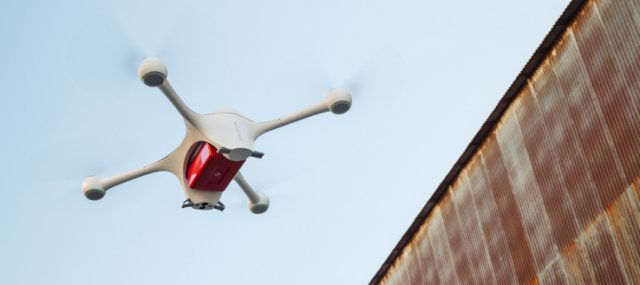
They are designed to reload their payload and swap out batteries without human intervention. They work in conjunction with Mercedes Benz Vans’ on-board and cloud-based systems so that items within a van are loaded up into the drone, automatically, at the cue of software and with the help of robotic shelving systems within the van.
Matternet designed a hard-shelled case to protect and carry any given cargo. The drone’s payload can transmit data about the contents and destination of a given delivery.
For a logistics company using the Matternet M2 drones or Vision Vans, that data could serve as a kind of proof of delivery, and alert users the instant a package has arrived.
Andreas Raptopoulos, co-founder and CEO of Matternet explained that while all of this sounds and looks like the stuff of sci-fi, the vans with integrated drone technology could be put to immediate good use where regulations allow.
The Vision Van can, for example, launch a Matternet M2 drone with a payload to a final destination that’s not accessible to a van or driver, whether that’s due to traffic in a populated urban area or a lack of safe roads in a more rural or disaster-stricken area.
Or, the drones could fly a package from a distribution center or warehouse to a van so a driver can ultimately take the package down and walk it up to a customer’s doorstep nearby.
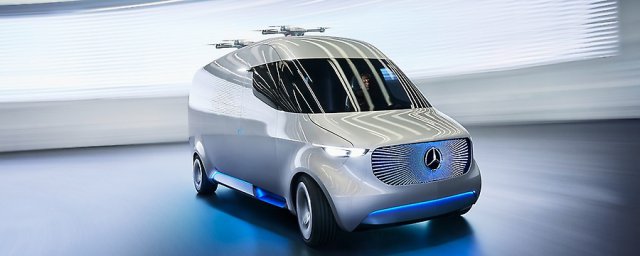
The Vision Van from Mercedes-Benz Vans is a revolutionary van study for the urban environment. As an integrated system, the vehicle merges a number of innovative technologies for last-mile delivery operations and thus sets the standard of performance requirements and solutions for future generations of vans.
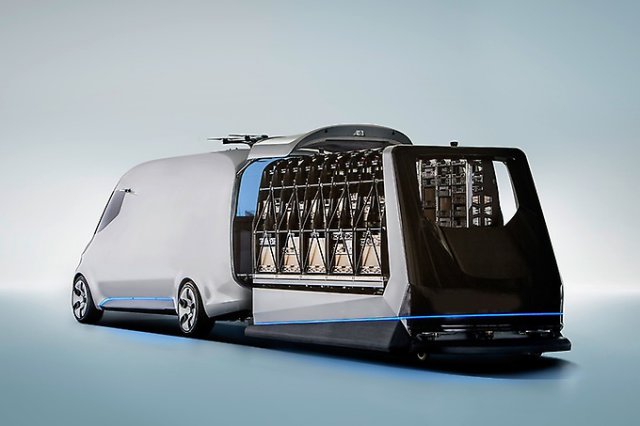
The Vision Van features a fully automated cargo space, integrated drones for autonomous air deliveries and a state-of-the-art joystick control. Powered by a 75 kW electric drive system with a range of up to 270 km, deliveries with the Vision Van are locally emission-free. The electric drive system additionally guarantees that it will remain possible to operate the Vision Van in inner-city zones where the introduction of bans on vehicles with internal combustion engines is planned. The virtually silent electric drive system facilitates late deliveries in residential areas for the purposes of same-day delivery.
Cloud-based control software meets optimum cargo hardware
The Vision Van merges numerous innovative technologies and serves as the central, intelligent element in a fully connected delivery chain. Innovative algorithms control order picking, the loading of packages, the fully automated cargo space management, route planning for the vehicle and the delivery drones.
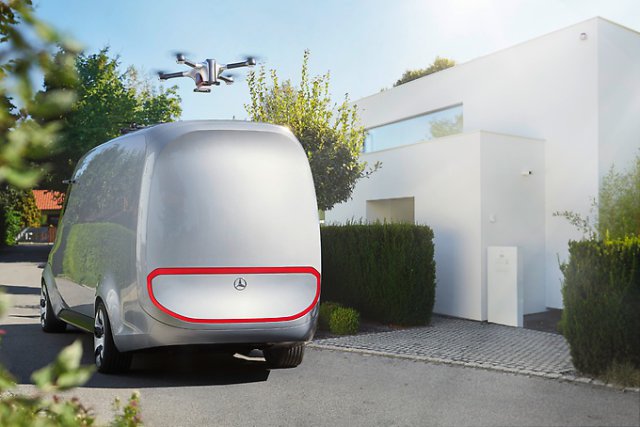
At the same time, the system supplies two drones with deliveries of up to 2 kg each. The drones then deliver the packages autonomously within a radius of 10 km.
They also calculate ideal delivery routes for the package deliverer. Automatic order picking takes place at the logistics centre, for example, and consignments are loaded into special racking systems. Driverless handling vehicles load the racks by way of an automated one-shot loading process. The intelligent cargo space management system automatically transfers packages for manual delivery to the deliverer at the delivery destination by means of a package dispenser on board the vehicle. At the same time, the system supplies two drones, each with a payload capacity of two kilogrammes, with consignments for autonomous delivery within a radius of 10 km.
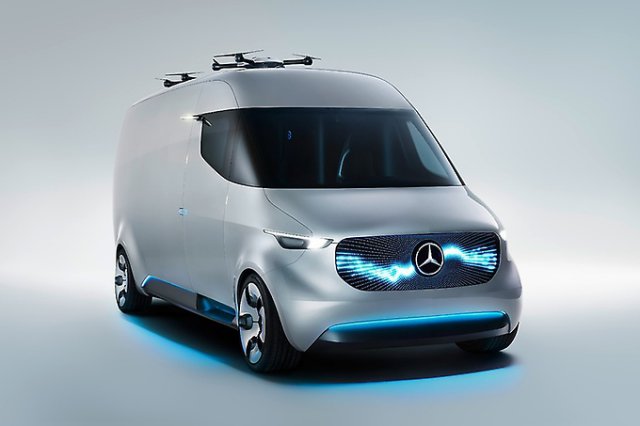
The front design alone is enough to transport the beholder into the distant future. The face is defined by the extremely wide windscreen, which curves around to the sidewalls like a high-tech visor, the Black Panel radiator grille with integrated LED matrix via which the Vision Van communicates with its surroundings and the progressively designed LED headlamps. The sharp contours of these elements contrast with the vehicle’s smooth surfaces, engaging in a fascinating dialogue between passion/emotion and technology/functionality. The vehicle communicates with its surroundings via LED displays on the front and rear. Warnings appear when the delivery drones take off, when the vehicle stops or when the deliverer alights, for example.
Being pared down to a maximum level of functionality the interior design comes in a highly futuristic guise. The designers have done without a steering wheel, pedals and centre console in favour of drive-by-wire control by means of a joystick, thereby creating new design options. This results in a unique interior centring on intelligent communication between driver and vehicle. It has also been possible to move the driver’s seat further forward to enlarge the vehicle’s useful floor space.
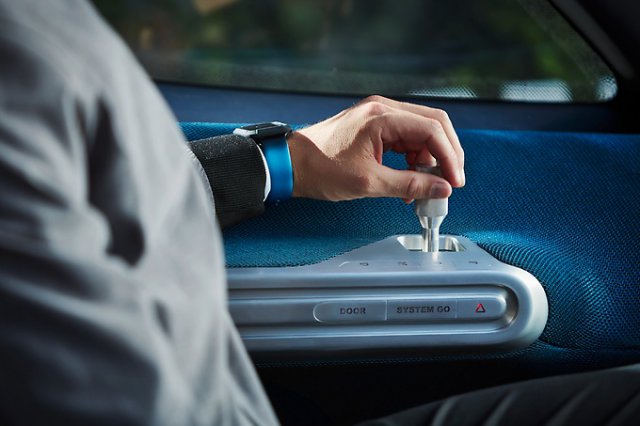
The electric drive system that powers the Vision Van has an output of 75 kW and a range of up to 270 km.
The dashboard in the shape of a broadly sweeping arc is covered with a premium textile and extends across the entire front end. The entire surface of the arc is used to provide the driver with all the information he needs for his work. When the Vision Van is in stand-by mode, the arc appears as a continuous blue surface with a black colour gradient. When the vehicle is in operation, the arc lights up and shows a tachometer, route planning information and drone flight data, for example.
The vehicle also communicates with the driver via the cabin floor. By way of a special effect LED indicators shine in the stainless steel floor, signalling to the driver whether pedestrians or cyclists are approaching, for example. At the rear wall of the driver’s cabin are the package dispenser and the driver’s info terminal providing all the relevant information on the delivery process. This terminal serves as a means of communication between the Vision Van’s autonomously functioning system environment and the driver, who is able to concentrate fully on the manual delivery task at hand. It also performs the role of a central control unit to interlink the intelligent vehicle, the automated systems and the information relating to the delivery orders to be carried out.
A division of Daimler, Mercedes Benz may be better known for its luxury and sports cars. However, the Mercedes Benz Vans unit sold 321,000 vehicles in 2015, according to a company financial statement, with popular models in travel and logistics including the Sprinter, Marco Polo, Vito (known as the Metris in the U.S.) and Citan.
According to a company press statement Mercedes Benz has invested an undisclosed amount in Matternet. According to SEC filings, Matternet has so far raised $9.5 million of a targeted $11.5 million venture funding round.
Raptopolous declined to comment on the filing or the company’s funding status. Executives from Mercedes Benz Vans were not immediately available for an interview.
Sources: Daimler, Tech Crunch
